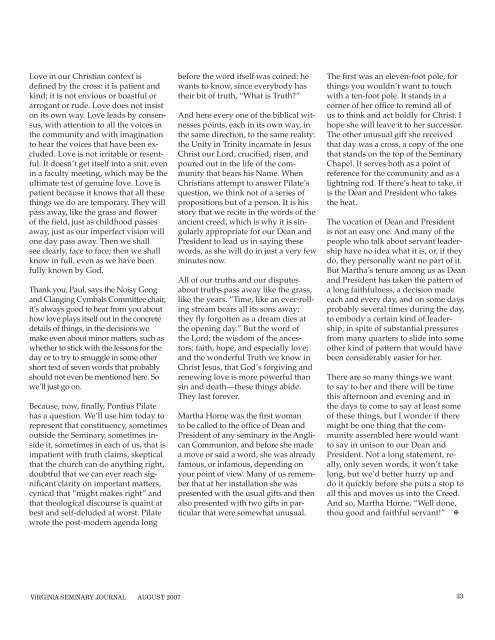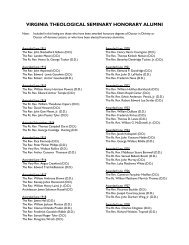Seminary Journal 2008 (August) - Virginia Theological Seminary
Seminary Journal 2008 (August) - Virginia Theological Seminary
Seminary Journal 2008 (August) - Virginia Theological Seminary
Create successful ePaper yourself
Turn your PDF publications into a flip-book with our unique Google optimized e-Paper software.
Love in our Christian context is<br />
defi ned by the cross: it is patient and<br />
kind; it is not envious or boastful or<br />
arrogant or rude. Love does not insist<br />
on its own way. Love leads by consensus,<br />
with attention to all the voices in<br />
the community and with imagination<br />
to hear the voices that have been excluded.<br />
Love is not irritable or resentful.<br />
It doesn’t get itself into a snit, even<br />
in a faculty meeting, which may be the<br />
ultimate test of genuine love. Love is<br />
patient because it knows that all these<br />
things we do are temporary. They will<br />
pass away, like the grass and fl ower<br />
of the fi eld, just as childhood passes<br />
away, just as our imperfect vision will<br />
one day pass away. Then we shall<br />
see clearly, face to face; then we shall<br />
know in full, even as we have been<br />
fully known by God.<br />
Thank you, Paul, says the Noisy Gong<br />
and Clanging Cymbals Committee chair,<br />
it’s always good to hear from you about<br />
how love plays itself out in the concrete<br />
details of things, in the decisions we<br />
make even about minor matters, such as<br />
whether to stick with the lessons for the<br />
day or to try to smuggle in some other<br />
short text of seven words that probably<br />
should not even be mentioned here. So<br />
we’ll just go on.<br />
Because, now, fi nally, Pontius Pilate<br />
has a question. We’ll use him today to<br />
represent that constituency, sometimes<br />
outside the <strong>Seminary</strong>, sometimes inside<br />
it, sometimes in each of us, that is<br />
impatient with truth claims, skeptical<br />
that the church can do anything right,<br />
doubtful that we can ever reach signifi<br />
cant clarity on important matters,<br />
cynical that “might makes right” and<br />
that theological discourse is quaint at<br />
best and self-deluded at worst. Pilate<br />
wrote the post-modern agenda long<br />
VIRGINIA SEMINARY JOURNAL AUGUST 2007<br />
before the word itself was coined: he<br />
wants to know, since everybody has<br />
their bit of truth, “What is Truth?”<br />
And here every one of the biblical witnesses<br />
points, each in its own way, in<br />
the same direction, to the same reality:<br />
the Unity in Trinity incarnate in Jesus<br />
Christ our Lord, crucifi ed, risen, and<br />
poured out in the life of the community<br />
that bears his Name. When<br />
Christians attempt to answer Pilate’s<br />
question, we think not of a series of<br />
propositions but of a person. It is his<br />
story that we recite in the words of the<br />
ancient creed, which is why it is singularly<br />
appropriate for our Dean and<br />
President to lead us in saying these<br />
words, as she will do in just a very few<br />
minutes now.<br />
All of our truths and our disputes<br />
about truths pass away like the grass,<br />
like the years. “Time, like an ever-rolling<br />
stream bears all its sons away;<br />
they fl y forgotten as a dream dies at<br />
the opening day.” But the word of<br />
the Lord; the wisdom of the ancestors;<br />
faith, hope, and especially love;<br />
and the wonderful Truth we know in<br />
Christ Jesus, that God’s forgiving and<br />
renewing love is more powerful than<br />
sin and death—these things abide.<br />
They last forever.<br />
Martha Horne was the fi rst woman<br />
to be called to the offi ce of Dean and<br />
President of any seminary in the Anglican<br />
Communion, and before she made<br />
a move or said a word, she was already<br />
famous, or infamous, depending on<br />
your point of view. Many of us remember<br />
that at her installation she was<br />
presented with the usual gifts and then<br />
also presented with two gifts in particular<br />
that were somewhat unusual.<br />
The fi rst was an eleven-foot pole, for<br />
things you wouldn’t want to touch<br />
with a ten-foot pole. It stands in a<br />
corner of her offi ce to remind all of<br />
us to think and act boldly for Christ. I<br />
hope she will leave it to her successor.<br />
The other unusual gift she received<br />
that day was a cross, a copy of the one<br />
that stands on the top of the <strong>Seminary</strong><br />
Chapel. It serves both as a point of<br />
reference for the community and as a<br />
lightning rod. If there’s heat to take, it<br />
is the Dean and President who takes<br />
the heat.<br />
The vocation of Dean and President<br />
is not an easy one. And many of the<br />
people who talk about servant leadership<br />
have no idea what it is, or, if they<br />
do, they personally want no part of it.<br />
But Martha’s tenure among us as Dean<br />
and President has taken the pattern of<br />
a long faithfulness, a decision made<br />
each and every day, and on some days<br />
probably several times during the day,<br />
to embody a certain kind of leadership,<br />
in spite of substantial pressures<br />
from many quarters to slide into some<br />
other kind of pattern that would have<br />
been considerably easier for her.<br />
There are so many things we want<br />
to say to her and there will be time<br />
this afternoon and evening and in<br />
the days to come to say at least some<br />
of these things, but I wonder if there<br />
might be one thing that the community<br />
assembled here would want<br />
to say in unison to our Dean and<br />
President. Not a long statement, really,<br />
only seven words, it won’t take<br />
long, but we’d better hurry up and<br />
do it quickly before she puts a stop to<br />
all this and moves us into the Creed.<br />
And so, Martha Horne, “Well done,<br />
thou good and faithful servant!” <br />
23



